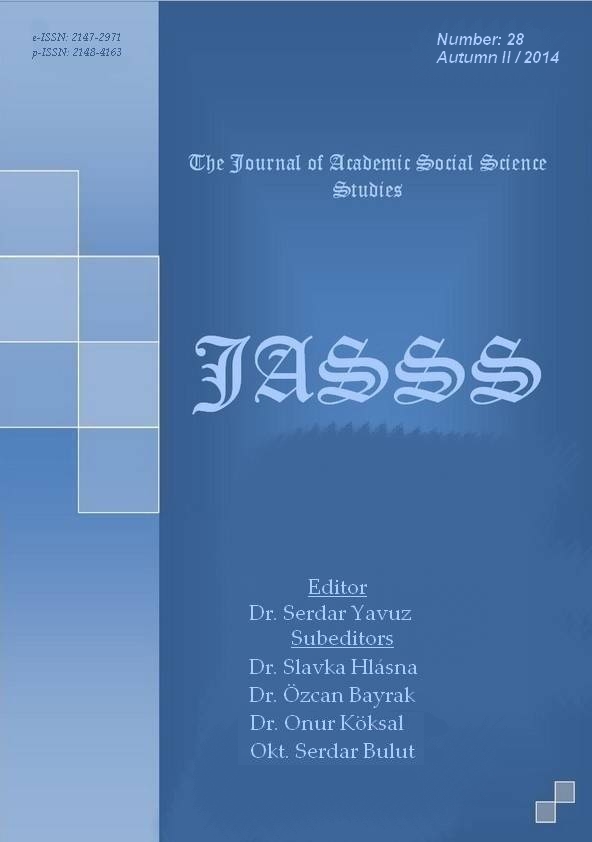Author :
Abstract
Fenomenoloji gibi salt felsefî bir yöntemle ele alındığında görülüyor ki, bir topluluğun yetkin millet olabilmesi veya öyle olduğunu iddia edebilmesi için en temel olarak bir süreçle gelişen ata, vatan, devlet, dil, töre ve kültür, din ortaklıkları gibi ortaklıkları taşıması gerekir. Bu unsurların bilinçlerde yerleşme gücüne göre milletler ve milliyyetler yetkinleşmektedirler. Fenomenoljik yöntemin millet ve milliyyet kavramlarına uygulanmasıyla elde edilen bu veriler ışığında bütün toplulukların ne derecede millet ve milliyyet vasfına sahip olduklarının değerlendirilebileceği tezimizden hareketle bu makalede aynı yöntem ve veriler ışığında Türk Milletinin tarihî seyir içinde sahip olduğu ata, vatan, devlet, dil, töre-kültür ve din ortaklığı unsurlarına bakarak ne derecede millet ve milliyyet vasfına sahip olduğunu, yetkin bir millet olup olmadığını araştırdık. Türkler tarihin hiçbir döneminde etnik, ırki esasa dayalı bir millet olma ve devlet kurma yoluna gitmemişlerdir. Irki mensubiyetten çok, töreyi ve hakkı esas almışlardır. Bununla birlikte tarih öncesine dayanan bir Türk Soyuna ve bunun bilincine sahiptirler. Dünyanın birçok bölgelerine yayılan ve gittikleri yerleri yurt, vatan edinen Türklerde yurt ahlâkı çok güçlüdür. Hiçbir Türk İl’i ve ulusu için canını ve en sevdiği şeylerini feda etmekten çekinmez. Türkler “Oguş” (aile), “urug” (aileler birliği, sülale, Şa’b), oymak (kabile, klan), “bod” (boy, ok, aşiret), “bodun” (boylar birliği, kavim), “il” veya “el” (bodunlar-kavimler birliği: müstakil topluluk, devlet, imparatorluk) şeklinde bir sosyal yapı ile devlet teşkilatları kurmuşlardır. Bu yapıyı Tarih öncesinden 20. Yüzyıla kadar geliştirmişler ve günümüz itibariyle Türkiye Cumhuriyeti gibi önemli devletler kurmuşlardır. Türkçe; Moğolca ve Mançu-Tunguzca, Japon ve Kore dilleri ile birlikte Altay dil ailesinin bir üyesidir. Dünyanın en köklü dillerinden biridir. Türk dili tarih içinde kendi doğal yapısından kaynaklanan değişmeler yanında çeşitli coğrafî dağılımlar, farklı sosyo-kültürel çevrelerle ilişki gibi dış faktörlerle bütün dillerde olduğu gibi bir yandan değişmiş, bir yandan da kollara, diyalektlere ayrılmıştır. 20. yüzyıl öncesine kadar genel Türk dili alanında diyalekt farklılıklarının derecesi çok büyük değildi. Ancak Rusça son dönemde Türk lehçelerine bir darbe vurmuştur. “Töre” kavramı halkın ortak değerleri olan ahlâk, din ve hukuku içinde barındıran belli bir nizama işaret eder. Türk adı töre kavramından gelir “türeli”’ (kanun v
Keywords
Abstract
When taken under debate by a pure philosophical method such as phenomenology, it is seen that a society, in order to be a competent nation or to claim to be so, needs to have basic common grounds developing in a process such as ancestor, homeland, state, language, custom and culture, religion. Nations and nationalities become perfect at the rate of these elements’ power of settling in consciousness. In the light of these data obtained by applying the phenomenological method to the concepts of nation and nationality, by moving with the thesis that it can be evaluated that to what extent all communities have the qualification of nation and nationality, in this article we have studied, in the light of the same method and the data, to what extent Turkish nation has the qualification of nation and nationality, whether they are a competent nation or not by looking at the common elements that Turkish nation have had through the history such as ancestor, homeland, state, language, custom-culture and religion. Turks have never chosen the path to be a nation or to found a state based on ethnical and racial basis throughout the history. They ground on custom and justice rather than racial connection. However they have the pre-historic Turkish origin and they are aware of it. The notion of homeland is very strong among Turks who have spread over many places in the world and made those places home. Not any Turk avoids sacrificing his own life and his favorite stuff for his country and nation. Turks have established states with a social structure in the form of “oguş” (family), “urug” (unity of families, strips), “oymak” (tribe, clan), “bod” (phratry, tribe), “bodun” (unity of tribes, peoples), “il” or “el” (unity of peoples, separate community, state, empire). They have developed this structure from pre-historic up to the 20th century and have founded important states such as the Republic of Turkey today. Turkish is a member of the Altaic linguistic family together with Mongolian and Manchu-Tungusic, Japanese, and Korean languages. It is one of the deepest rooted languages in the world. Besides with the changes arising from its own nature, as well as with the external factors such as geographical distributions, relationship with different socio-cultural environments, Turkish language, as it happens to all languages, has changed on the one hand and





